 Credit: Gordon Mah Ung
Credit: Gordon Mah Ung
Intel's 11th-gen Rocket Lake-S CPU is a star athlete on farewell tour. The 14nm process at the heart of this chip is very much like that player who, with hair graying and multi-season records and clutch wins distant memories, has probably hung on just a little too long. There are no more buzzer beaters or overtime games. Just an early out to watch the playoffs on television with everyone else.
Still, the heart of any champion always has some fight. Its arch nemesis, AMD's Ryzen 9 5900X, may be the stronger chip for many tasks. Despite its weak knees, the old 14nm process shows it still has a few moves left in Rocket Lake.
There's a lot to cover, so if you want to jump to a specific section, use our links below:
- What is 11th-gen Rocket Lake?
- Intel Core i9-11900K performance: How we tested
- Core i9-11900K performance: Rendering
- Core i9-11900K performance: Encryption and Compression
- Core i9-11900K performance: Productivity
- Core i9-11900K performance: Adobe applications
- Core i9-11900K performance: AI applications
- Core i9-11900K performance: Gaming
- Rocket Lake Power Consumption
- Rocket Lake Conclusion
What is 11th-gen Rocket Lake?
Thanks to endless leaks, almost everything you need to know about Rocket Lake-S is already out there. The gist is that Rocket Lake is the last lap for Intel’s aging 14nm manufacturing process, first introduced in 2014—yes, seven years ago. But while prior generations built on 14nm, from 6th-gen Skylake to 10th-gen Comet Lake, were mostly iterative designs, the 11th-gen Rocket Lake will be based on the newer cores used in its 10th-gen and 11th-gen laptop CPUs.
The key difference between the laptop and desktop Rocket Lake versions is the process. Intel’s most advanced 10nm FinFET process stays on laptops, while the veteran 14nm rides one last time for its desktop chip. We are testing the desktop chip in this review.
When you mash together two different generations of chip design, there are inevitably compromises. The first is core count, which actually decreases from 10 cores to 8 cores on the Core i9. The second is in power consumption—which is eyebrow-raising to see in action.
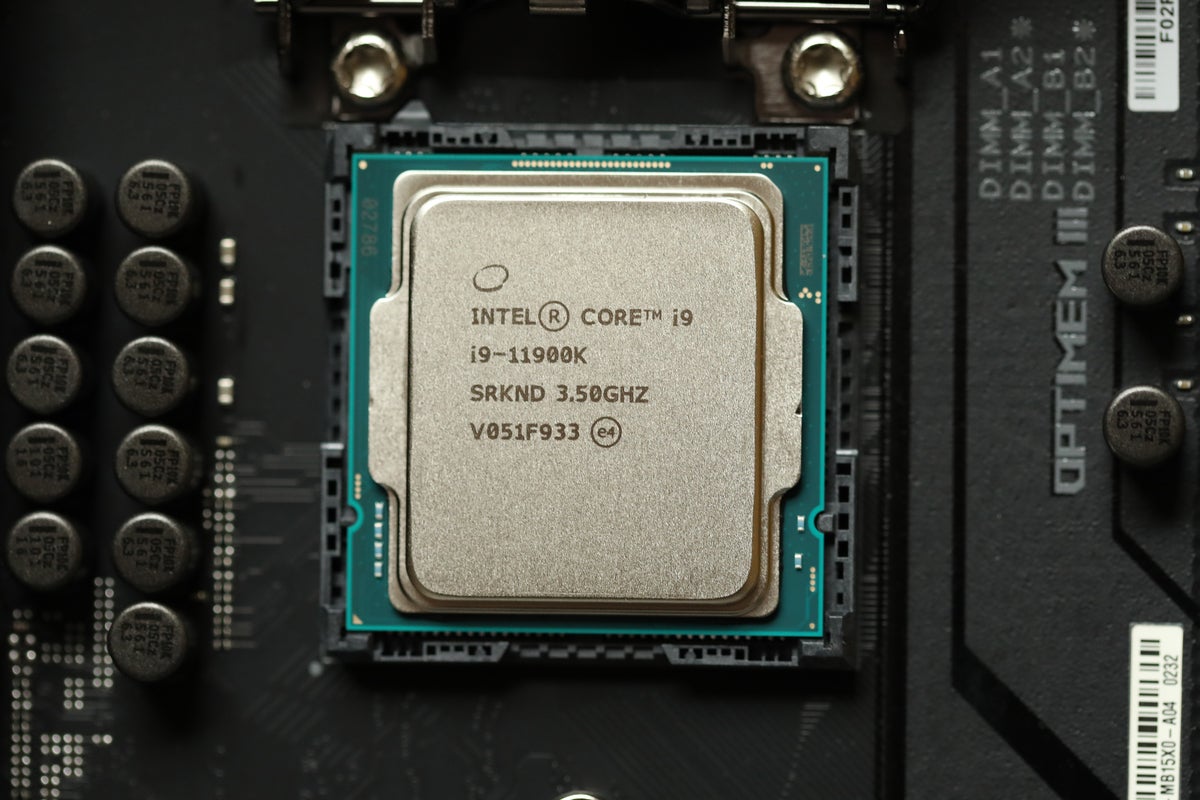 Gordon Mah Ung
Gordon Mah UngCore i9-11900K performance: How we tested
We tested Rocket Lake-S, specifically the 8-core Core i9-11900K, against its 10th-gen predecessor and its arch-rival: AMD’s flagship 12-core Ryzen 9 5900X. What follows are the test configurations:
- Intel 11th-gen 8-core Core i9-11900K with an MSRP of $540 in an Asus Maximus XII Extreme Z490 motherboard with 32GB of dual-rank, dual-channel DDR4/3600 Corsair Dominator RAM, Samsung 960 Pro M.2 NVMe SSD, GeForce RTX 2080 Ti Founders Edition, and Kraken X62 cooler.
- Intel 10th-gen 10-core Core i9-10900K with an MSRP of $500 in an Asus Maximus XIII Hero Z590 motherboard with 32GB of dual-rank, dual-channel DDR4/3600 Corsair Dominator RAM, Corsair MP600 PCIe 4.0 NVMe SSD, GeForce RTX 2080 Ti Founders Edition, and Kraken X62 cooler.
- AMD 12-core Ryzen 9 5900X with an MSRP of $550 in an MSI X570 MEG Godlike motherboard with 32GB of dual-rank, dual-channel DDR4/3600 Corsair Dominator RAM, Corsair MP600 PCIe 4.0 M.2 NVMe SSD, GeForce RTX 2080 Ti Founders Edition, and Kraken X62 cooler.
We loaded XMP and AMP profiles for all of the test configurations, manually locked the Kraken CLC cooler at 100-percent fan speeds, and also let the Intel motherboards run in auto for MCE. For the Rocket Lake system, we enabled Intel’s new Adaptive Boost Technology, which attempts to run the cores at their maximum clock speeds.
All three of the test configurations used a GeForce RTX 2080 Ti Founders Edition card. With PCIe 4.0 finally arriving for Intel, however, we swapped the card out for an Asus GeForce RTX 3080 TUF card with its manual switch set to “performance” for the gaming tests.
We opted to leave off Nvidia and Intel’s Resizable BAR option for both Intel boards. The MSI X570 MEG Godlike does not appear to support the feature yet, so we felt leaving it off would level the playing field for a feature that will start to come to more AMD-based boards as well.
All of the testing was done using the same version of Windows 10 2H20, and with the latest drivers and BIOSes available for the motherboards.
Finally, power testing was conducted using identical Corsair HX1000 80 Plus Platinum PSUs. We’ll explain in detail how we looked at power consumption of Rocket Lake in the power section below.
Due to new OS versions, BIOSes, GPU drivers, and the limited space of our current global situation, we’ve focused our testing on only these three key chips. This narrows the scope, but it does at least deliver fresh results rather than recycling of prior tests.
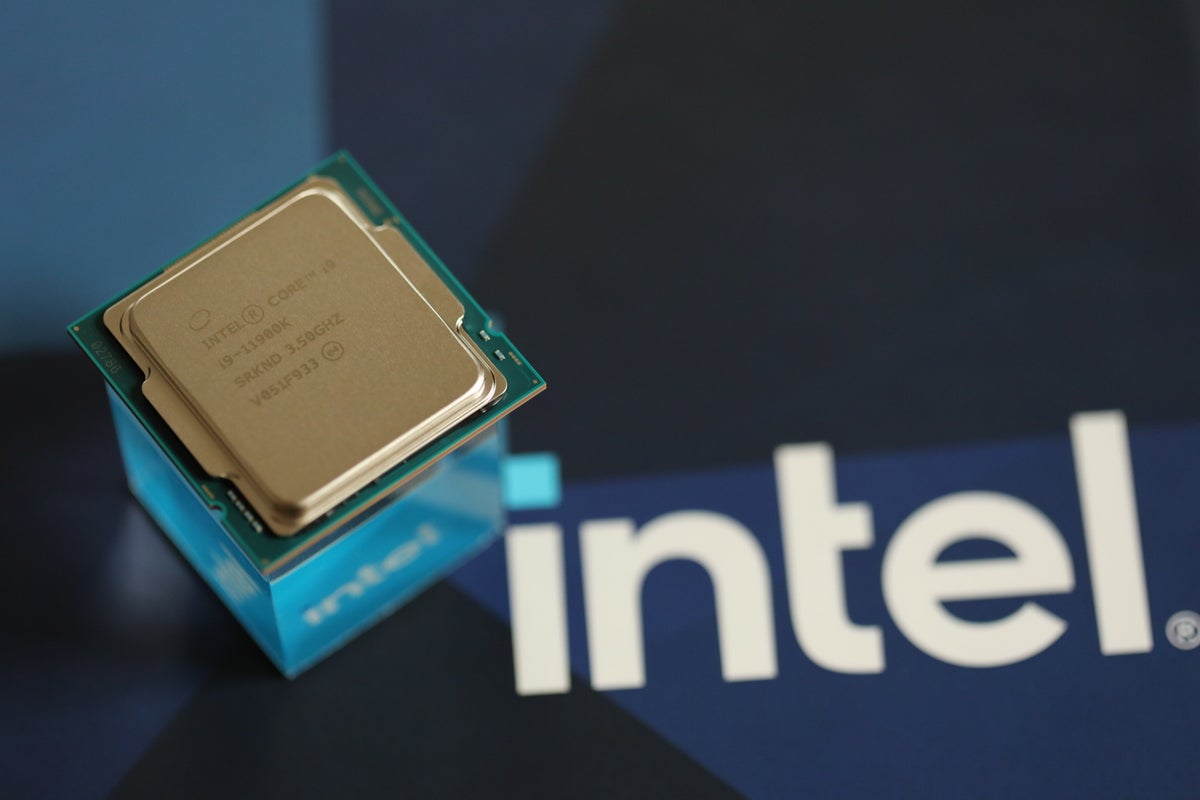 Gordon Mah Ung
Gordon Mah UngCore i9-11900K performance: Rendering
We’ll kick this off in an area that Intel hasn’t discussed much: 3D modelling. The vast majority of 3D modelling used to create those amazing cinematic visual effects you see in movies today run faster on systems with more cores. Serious professionals will likely use a beefier CPU such as a Ryzen Threadripper or Xeon Platinum, but a dabbler, or a freelance VFX artist on a budget, may be looking at these “lower-end” premium consumer chips.
The first result below is Maxon’s Cinebench R20, a popular modelling benchmark built on the same engine the company uses in its Cinema4D commercial project. Cinema4D is also licensed out and used in Adobe Premiere, After Effects, and other popular video tools.
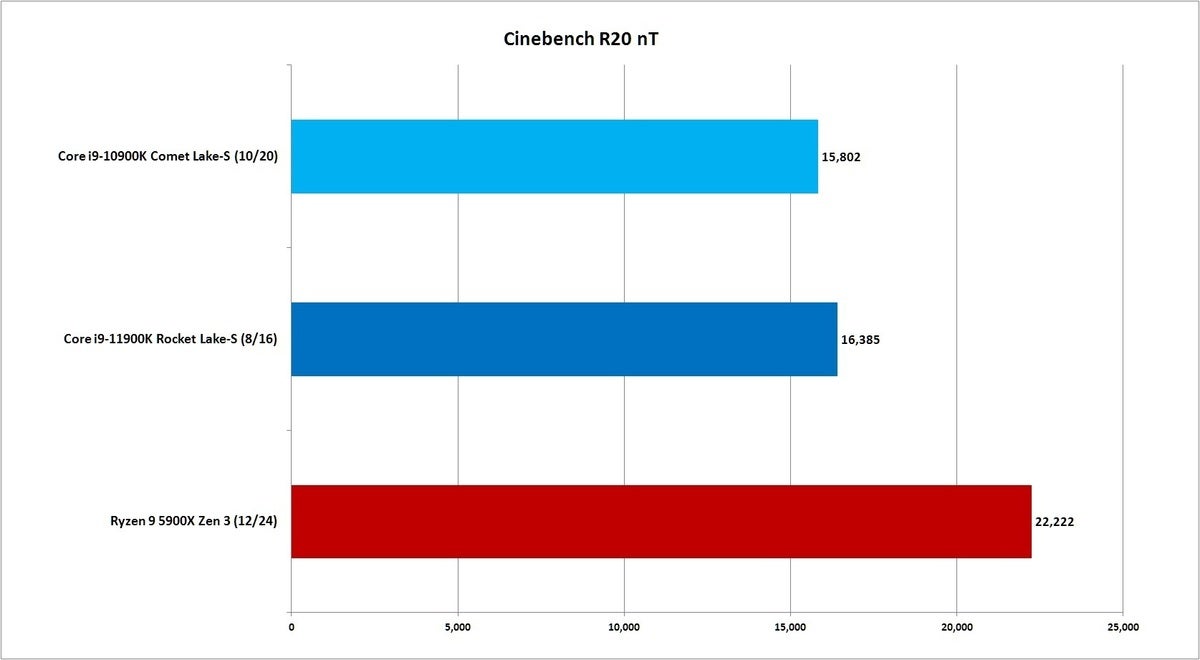 IDG
IDG
Longer bars indicate better performance
The 12-core Ryzen 9 5900X easily outpaces the 8-core Core i9-11900K to the tune of about 36 percent more performance. That’s not good. But look at the performance of the 11th-gen Core i9-11900K versus the 10th-gen Core i9-10900K. Remember: Cinebench R20 loves CPU cores, but the 11th-gen Rocket Lake chip is an 8-core chip that’s actually slightly faster in this test than the 10-core, 10th-gen chip. It shows that the newer Cypress Cove cores are indeed much improved.
Cinebench R20’s engine uses AVX, which can depress clock speeds on Intel’s older core designs. Not all rendering engines, however, use AVX or newer instruction sets of the CPUs. POV-Ray, for example, was designed in the days of the Commodore Amiga, but it has been loyally maintained for more modern computers. As with Cinebench, more cores yield more performancein POV-Ray—and the 12-core Ryzen 9 5900X wins decisively.
This is also one of the few times when the older 10-core Core i9-10900K outruns the 8-core Core i9-11900K. That doesn't look good, but the real question is whether your workload more closely aligns with Cinebench’s commercial engine, which is licensed for use in Adobe and other products, or the free POV-Ray.
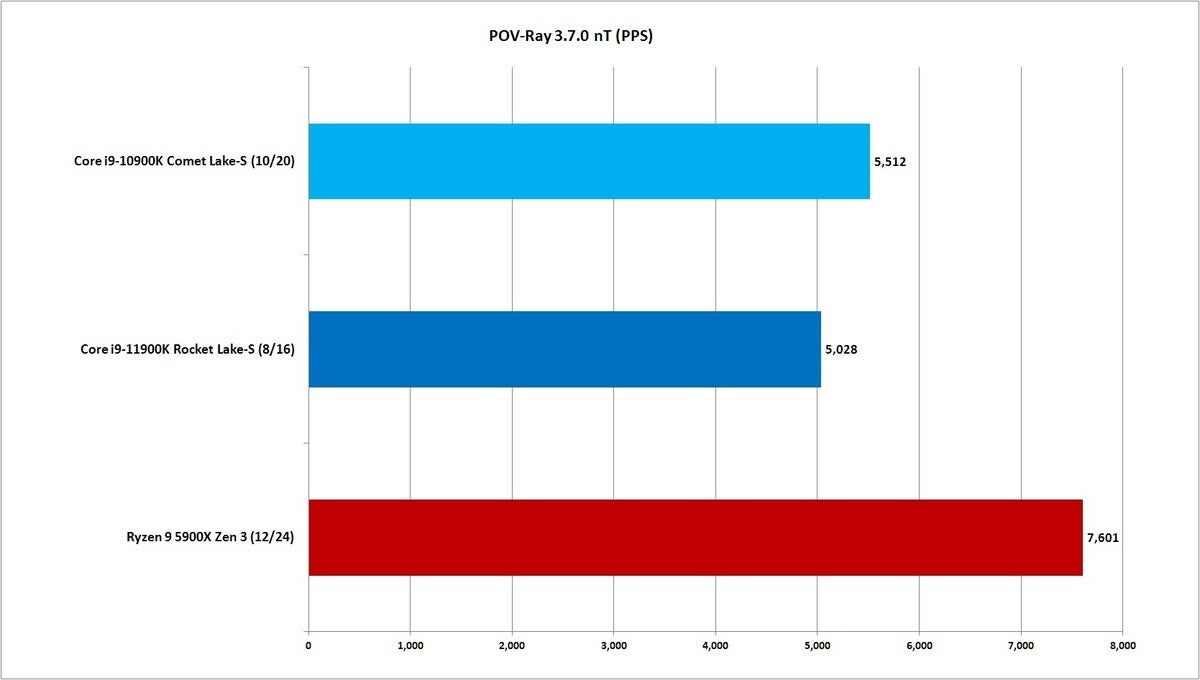 IDG
IDG
Longer bars indicate better performance
Another instance where 10th-gen beats 11th-gen is in Chaos Group’s Corona Renderer 1.3. This is an unbiased renderer, which essentially means it takes no shortcuts in rendering a scene. The results again put the older 10th-gen chip ahead of the 11th gen.
It's important to note, however, that Corona Benchmark 1.3 was released in 2016. The newest version—it’s up to 6 now—may actually favor the 11th gen’s newer design. Of course, you could just buy a Ryzen instead and not worry about it.
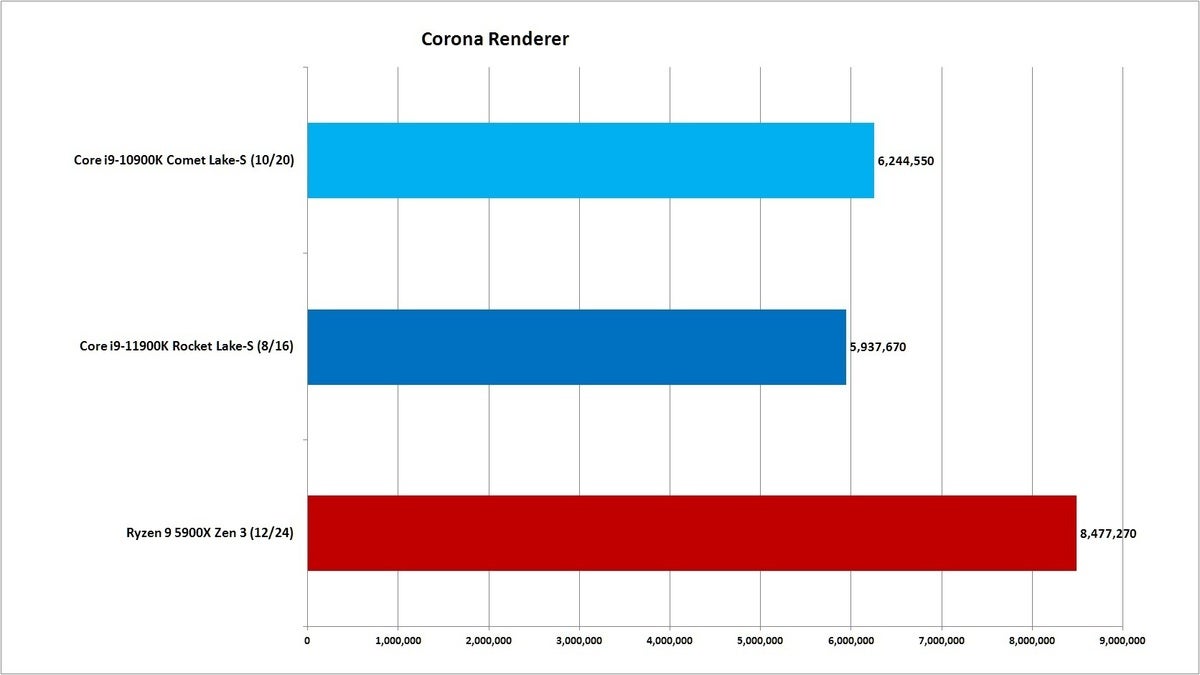 IDG
IDG
Longer bars indicate better performance
Our next benchmark is the open-source Blender 2.92.0 and the default cycles-render engine on Mike Pan’s BMW benchmark. There are larger benchmark scenes and more complicated ones, but the results probably won’t change much here, with the chips falling in order of Ryzen 9, 11th-gen, and 10th-gen.
Based on these and additional rendering benchmarks we ran, it seems clear that the 8 cores in Rocket Lake’s Core i9-11900K will not outpace the 12 cores in Ryzen 9 5900X in tasks that favor more cores. For these tasks, Ryzen 9 wins. It’s more of a toss-up between 10th-gen Comet Lake and 11th-gen Rocket Lake, though Rocket Lake wins a bit more often.
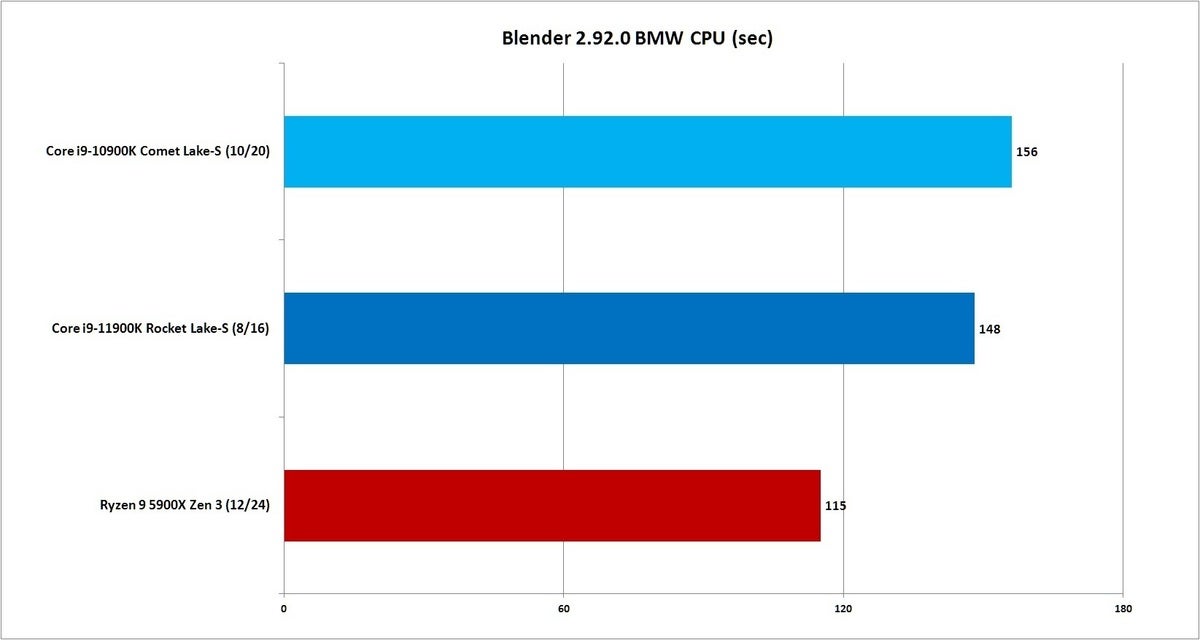 IDG
IDG
Longer bars indicate better performance
We’ll close the 3D rendering section by looking at two of the tests in their single-threaded modes. This is handy to give potential buyers an idea of how strong each core is regardless of how many cores the chip has. Obviously, few will buy a 12-core chip and run rendering on just one core, but it does give you a general way to judge, say, how fast they would be if the core counts were closer, like they are on other models of the chips.
Using Cinebench R20, we can see Intel’s 11th-gen Rocket Lake turn in its first technical win by slightly outscoring the Ryzen 9 5900X. Yes, it’s really a tie, but when an elderly 14nm process can actually run with a 7nm process, that’s not bad.
Of greater use is comparing the 10th-gen to the 11th-gen part. There we see the 11th-gen Rocket Lake outpace the 10th-gen Comet Lake chip by almost 20 percent. That’s very impressive performance that even the haters can't deny.
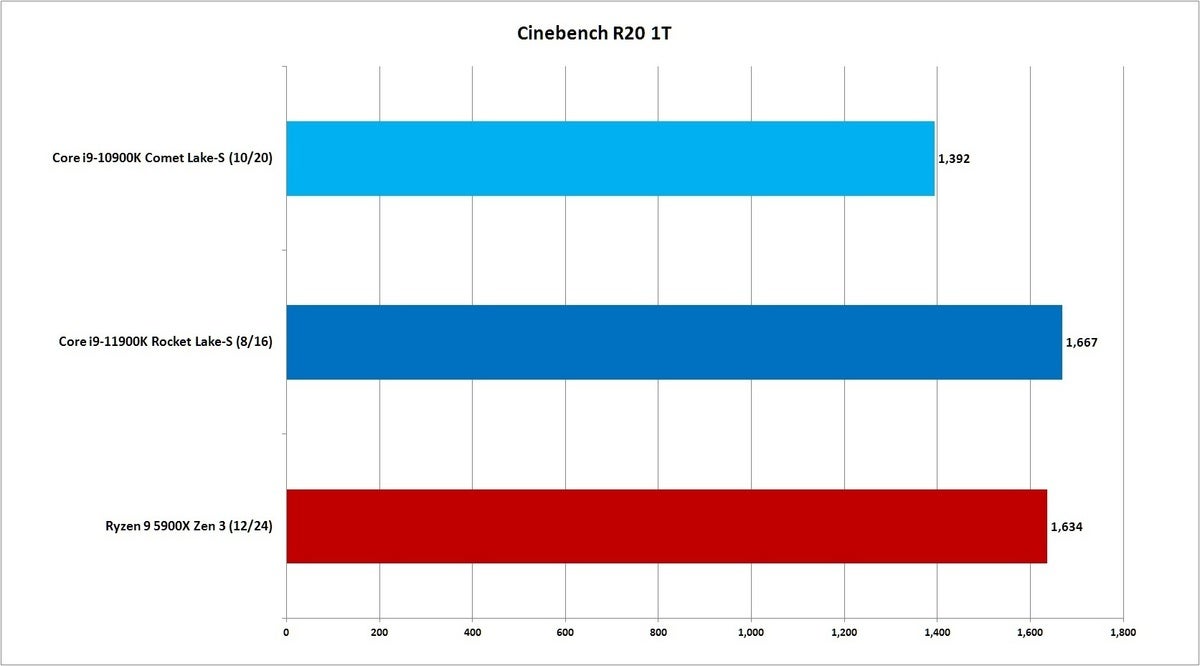 IDG
IDG
Longer bars indicate better performance
In POV-Ray 3.7.0 on a single thread, you can see the Cypress Cove cores in the 11th gen again pull ahead by a very nice 17 percent against its 10th-gen predecessor, and finish in a statistical dead heat with Ryzen 9 5900X. That’s a solid win for the 11th-gen Rocket Lake.
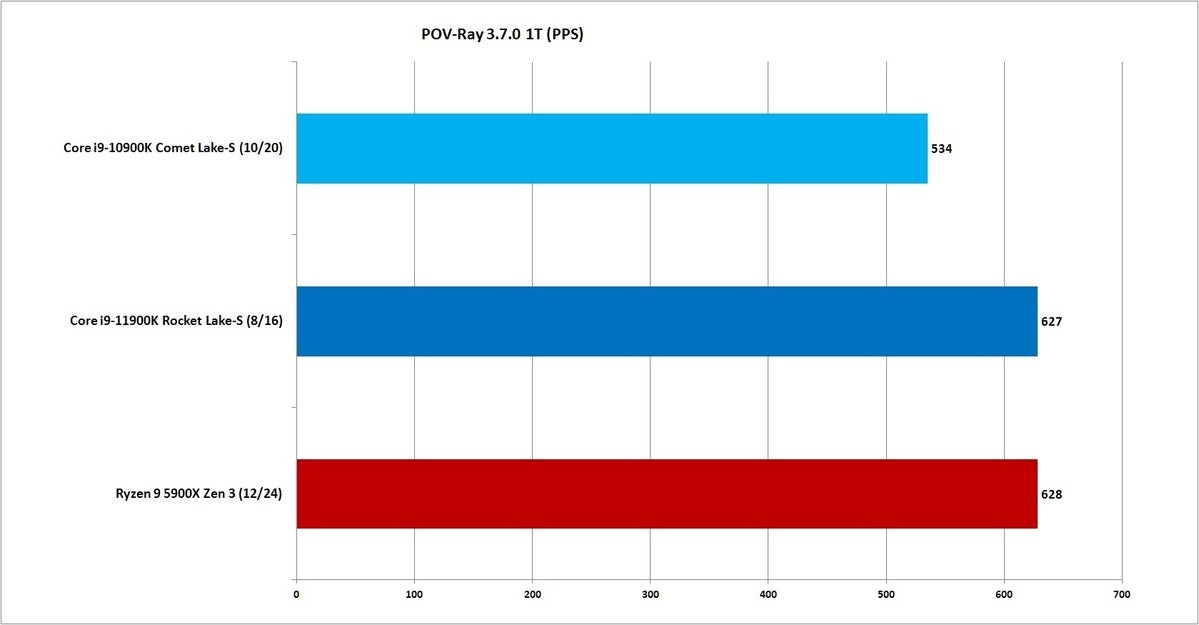 IDG
IDG
Longer bars indicate better performance
Keep reading for more performance numbers, starting with encryption.

















